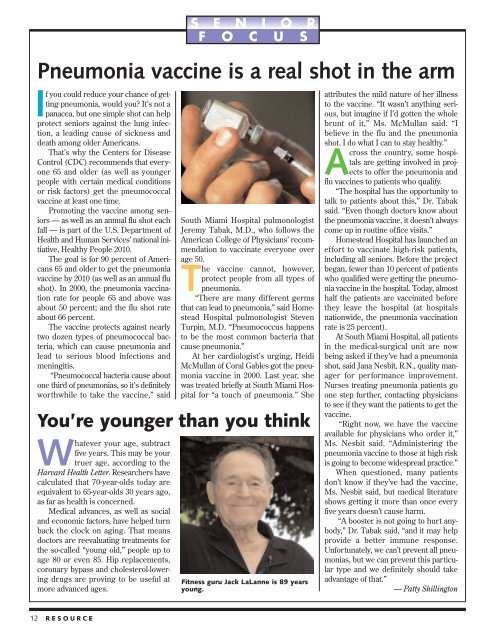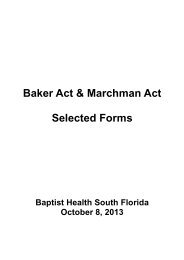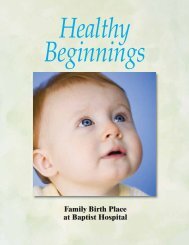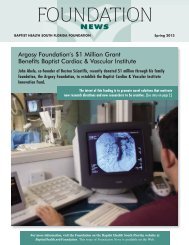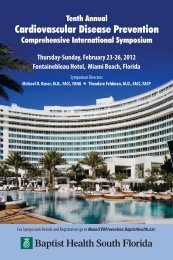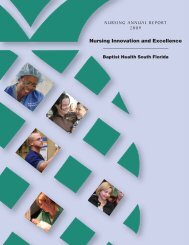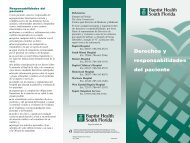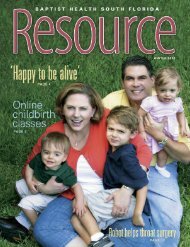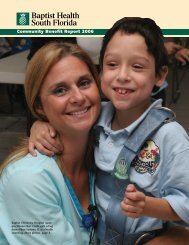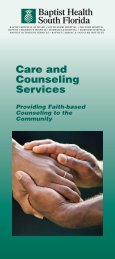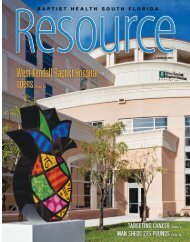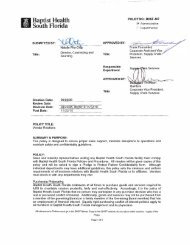Resource: Spring 2004 - Baptist Health South Florida
Resource: Spring 2004 - Baptist Health South Florida
Resource: Spring 2004 - Baptist Health South Florida
- TAGS
- baptist
- baptisthealth.net
You also want an ePaper? Increase the reach of your titles
YUMPU automatically turns print PDFs into web optimized ePapers that Google loves.
If you could reduce your chance of getting<br />
pneumonia, would you? It’s not a<br />
panacea, but one simple shot can help<br />
protect seniors against the lung infection,<br />
a leading cause of sickness and<br />
death among older Americans.<br />
That’s why the Centers for Disease<br />
Control (CDC) recommends that everyone<br />
65 and older (as well as younger<br />
people with certain medical conditions<br />
or risk factors) get the pneumococcal<br />
vaccine at least one time.<br />
Promoting the vaccine among seniors<br />
— as well as an annual flu shot each<br />
fall — is part of the U.S. Department of<br />
<strong>Health</strong> and Human Services’ national initiative,<br />
<strong>Health</strong>y People 2010.<br />
The goal is for 90 percent of Americans<br />
65 and older to get the pneumonia<br />
vaccine by 2010 (as well as an annual flu<br />
shot). In 2000, the pneumonia vaccination<br />
rate for people 65 and above was<br />
about 50 percent; and the flu shot rate<br />
about 66 percent.<br />
The vaccine protects against nearly<br />
two dozen types of pneumococcal bacteria,<br />
which can cause pneumonia and<br />
lead to serious blood infections and<br />
meningitis.<br />
“Pneumococcal bacteria cause about<br />
one third of pneumonias, so it’s definitely<br />
worthwhile to take the vaccine,” said<br />
12 RESOURCE<br />
S E N I O R<br />
F O C U S<br />
Pneumonia vaccine is a real shot in the arm<br />
<strong>South</strong> Miami Hospital pulmonologist<br />
Jeremy Tabak, M.D., who follows the<br />
American College of Physicians’ recommendation<br />
to vaccinate everyone over<br />
age 50.<br />
The vaccine cannot, however,<br />
protect people from all types of<br />
pneumonia.<br />
“There are many different germs<br />
that can lead to pneumonia,” said Homestead<br />
Hospital pulmonologist Steven<br />
Turpin, M.D. “Pneumococcus happens<br />
to be the most common bacteria that<br />
cause pneumonia.”<br />
At her cardiologist’s urging, Heidi<br />
McMullan of Coral Gables got the pneumonia<br />
vaccine in 2000. Last year, she<br />
was treated briefly at <strong>South</strong> Miami Hospital<br />
for “a touch of pneumonia.” She<br />
You’re younger than you think<br />
Whatever your age, subtract<br />
five years. This may be your<br />
truer age, according to the<br />
Harvard <strong>Health</strong> Letter. Researchers have<br />
calculated that 70-year-olds today are<br />
equivalent to 65-year-olds 30 years ago,<br />
as far as health is concerned.<br />
Medical advances, as well as social<br />
and economic factors, have helped turn<br />
back the clock on aging. That means<br />
doctors are reevaluating treatments for<br />
the so-called “young old,” people up to<br />
age 80 or even 85. Hip replacements,<br />
coronary bypass and cholesterol-lowering<br />
drugs are proving to be useful at<br />
more advanced ages.<br />
Fitness guru Jack LaLanne is 89 years<br />
young.<br />
attributes the mild nature of her illness<br />
to the vaccine. “It wasn’t anything serious,<br />
but imagine if I’d gotten the whole<br />
brunt of it,” Ms. McMullan said. “I<br />
believe in the flu and the pneumonia<br />
shot. I do what I can to stay healthy.”<br />
Across the country, some hospitals<br />
are getting involved in projects<br />
to offer the pneumonia and<br />
flu vaccines to patients who qualify.<br />
“The hospital has the opportunity to<br />
talk to patients about this,” Dr. Tabak<br />
said. “Even though doctors know about<br />
the pneumonia vaccine, it doesn’t always<br />
come up in routine office visits.”<br />
Homestead Hospital has launched an<br />
effort to vaccinate high-risk patients,<br />
including all seniors. Before the project<br />
began, fewer than 10 percent of patients<br />
who qualified were getting the pneumonia<br />
vaccine in the hospital. Today, almost<br />
half the patients are vaccinated before<br />
they leave the hospital (at hospitals<br />
nationwide, the pneumonia vaccination<br />
rate is 25 percent).<br />
At <strong>South</strong> Miami Hospital, all patients<br />
in the medical-surgical unit are now<br />
being asked if they’ve had a pneumonia<br />
shot, said Jana Nesbit, R.N., quality manager<br />
for performance improvement.<br />
Nurses treating pneumonia patients go<br />
one step further, contacting physicians<br />
to see if they want the patients to get the<br />
vaccine.<br />
“Right now, we have the vaccine<br />
available for physicians who order it,”<br />
Ms. Nesbit said. “Administering the<br />
pneumonia vaccine to those at high risk<br />
is going to become widespread practice.”<br />
When questioned, many patients<br />
don’t know if they’ve had the vaccine,<br />
Ms. Nesbit said, but medical literature<br />
shows getting it more than once every<br />
five years doesn’t cause harm.<br />
“A booster is not going to hurt anybody,”<br />
Dr. Tabak said, “and it may help<br />
provide a better immune response.<br />
Unfortunately, we can’t prevent all pneumonias,<br />
but we can prevent this particular<br />
type and we definitely should take<br />
advantage of that.”<br />
— Patty Shillington


